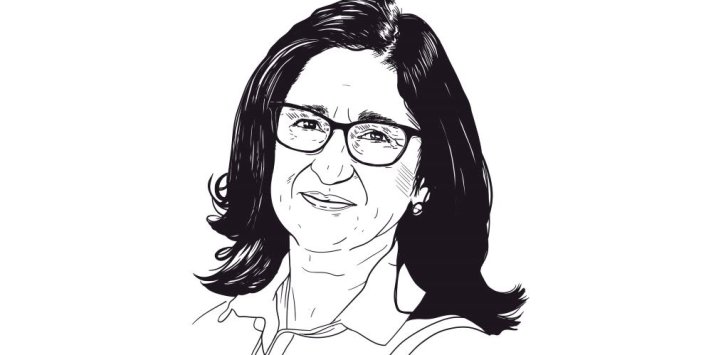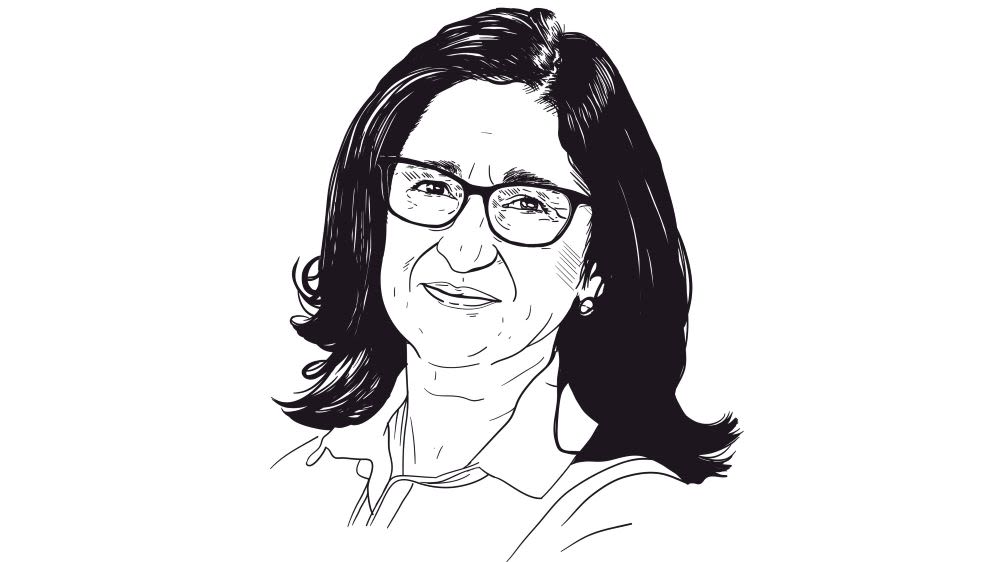
Shafik has inhabited the upper reaches of elite institutions on both sides of the Atlantic for decades (Illustration by by Tracy Worrall)
7 min read
If Keir Starmer is to pull the country – and himself – from the economic mire, it will be in part because of a 63-year-old barely known to MPs, let alone voters.
In the weeks to come, ahead of a Budget widely assumed to determine his fate, the Prime Minister will be spending many hours with Minouche Shafik, his new economic adviser.
She may not be a household name, but Baroness Shafik, an Egyptian-born British American, has inhabited the upper reaches of elite institutions on both sides of the Atlantic for decades.
Like Keir Starmer, she also knows what it is to be in the eye of a political storm. A stellar career, which included becoming the youngest ever World Bank vice-president, looked to have flamed out little over a year ago, when she was forced to resign as president of Columbia University. Her handling of student protests over Gaza was subject to a three-hour mauling at a Congressional committee that a friend described to The House as a “lynch mob”.
That might have been the end – but Shafik has a chance of redemption in her new role at the head of the newly beefed-up No 10 economic unit, tasked with balancing out and, where necessary, challenging the Treasury.
Speaking to The House, childhood friend Hillary Leone says Shafik has always had lofty – and idealist – ambitions. It was when Leone visited her childhood friend when she was a student at the University of Massachusetts, that the two agreed they wanted “to change the world”.
“I’ve always been interested in why people become rich or poor, how social forces determine our chances of success in life, and how societies can be made fairer so that everybody has the same opportunities. I trace this back to my roots in Alexandria, Egypt, where I was born into a comfortable family in a society marked by severe inequality,” Shafik told Columbia’s in-house magazine on her appointment in 2023.
Born in 1962, she moved to the US at the age of four after the family’s property was seized as part of a nationalisation programme.
In the same interview, she said she had been shaped by being “an immigrant growing up in the American south” at a pivotal moment in the country’s history of desegregation, a time she has described as being populated by “explosive racial tensions”.
Completing a PhD in economics at the University of Oxford, she joined the World Bank, working in a series of roles before becoming the organisation’s youngest-ever vice-president at just 36, and later the first woman to lead Columbia University.
Between those roles, Shafik headed up the now-disbanded Department for International Development as permanent secretary from 2008 to 2011; a department bolstered under Tony Blair’s push for greater international aid. Those who worked closely with her at the time praise her leadership, as well as her “skill, integrity and distinction”.
Conservative MP Andrew Mitchell, who was international development secretary and overlapped with Shafik after the Coalition was formed in 2010, says of her: “For a department set up by Labour with its first incoming Conservative SoS [secretary of state], this could have been a difficult moment. That it was not was very much due to the leadership of Shafik.”
Mitchell adds: “Starmer is extremely fortunate to have persuaded her to come on board and help rescue his dreadful economic stewardship.”
While her views on the UK’s cutting of international aid to fund defence spending have not been made public, she described similar cuts by the US as an “assault”, “misguided and short-sighted”.
One former co-worker, who wished to remain anonymous, tells The House: “She must have been profoundly disappointed.”
Lord O’Donnell, who worked with Shafik when he was cabinet secretary between 2005 and 2011, says he does not know Shafik’s thoughts on the aid cut either, but remarks: “She will be disappointed by the reduction in aid, both in the UK and the US.”
However, he is insistent “that’s done, that’s a decision the government’s made, and she’ll get on with it”.
Friend and fellow economist Nick Barr, a professor at the London School of Economics (LSE), where Shafik worked as president from 2017 to 2023, watched her face a three-hour hearing at the Congressional Education Committee in April of 2024.
“Seeing someone you regard as a friend being put through the meat grinder is horrendous.”
Shafik resigned in August 2024 – she ultimately concluded that her resignation would “best enable Columbia to traverse the challenges ahead”.
A dedication to public service is sure to have drawn Starmer to Shafik. Those who know her are adamant that she does not hold a particular political ideology.
Former LSE colleague Barr reinforces this point of view. While he describes the former president to “naturally think in Labour terms” about opportunity and equity, she is “agnostic in principle about whether markets should do it or the state”.
She was tasked by Conservative chancellor George Osborne with leading on the Fair and Effective Markets Review in 2014 after a number of high-profile abuse cases, and was considered for the role of governor of the Bank of England (where she worked as deputy governor from 2014 to 2017), though the job ultimately went to Andrew Bailey.
Shafik began her time at the World Bank organisation as a researcher, before later becoming vice-president of the private sector development and infrastructure department.
One of Shafik’s economic advisers during her time there describes it as an organisation where individuals “end up working with, easily on a daily basis, 20 to 35 different nationalities”.
Starmer is very keen to say there’s no such thing as Starmerism, but that he just wants to make the economy work better. I think that would be Minouche’s line too.
Significantly, in her new role, which could easily be seen as a challenge to Rachel Reeves, Shafik is said to have a preference for collaboration. An ability to work with a wide range of individuals means that Shafik is labelled by many as a “consensus builder”.
They added that she became VP at a time when “there were fights within the institution” with some pushing for the private sector and she was a “subtle referee” to these tensions.
While Shafik is described by many as someone who fosters collaboration, childhood friend Leone is clear that she is not a pushover: “I don’t think she’s afraid to stand up and make [hard decisions].”
Working under difficult conditions is something that Shafik is recalled by former colleagues at LSE to have excelled at, with Barr among others praising the “wonderful, inclusive atmosphere” she managed to foster during the pandemic, keeping staff connected.
One person who has previously worked as an adviser in No 10 tells The House that Shafik’s strengths lie in building up a team, indicating this would be a good starting point for the new chief economic adviser.
Where Starmer has faced criticism for his lack of emotional intelligence, Shafik is overflowing with it, say her friends and former colleagues. Professor Eric Neumayer, who worked with Shafik at the LSE, describes her as “very warm, very personally approachable, very open and always very transparent in all her dealings”.
“She is a very human person, she has a lot of emotional intelligence, a lot of empathy and deeply cares about people and their livelihoods, and I think this is a great quality to have. She is not a bureaucrat in that sense.”
Olivier Blanchard, who worked alongside Shafik at the IMF, similarly labels her “a good (and smart) listener”, something that will be “important in her new position”.
In other ways, Shafik is likened to Starmer. Another former colleague who worked with Shafik at the LSE and wished to remain anonymous tells The House that the Prime Minister and his new adviser share a pragmatism. “Starmer is very keen to say there’s no such thing as Starmerism, but that he just wants to make the economy work better. I think that would be Minouche’s line too.”
“This is a damn difficult job because the country is not in a great shape,” Shafik’s former colleague Neumayer reflects, “and to be the chief economic adviser, that is quite a challenge”.
